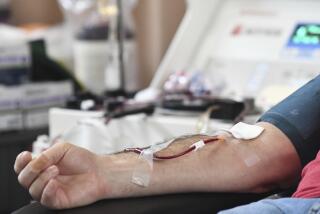Banking on your own blood
After federal officials chastised the American Red Cross earlier this month for not doing enough to keep the blood supply safe, blood experts took great pains to emphasize that the risk of contamination is, in fact, smaller than ever.
Newer, more sensitive tests can now detect viruses such as hepatitis and HIV with greater accuracy, said George J. Nemo, a transfusion expert at the National Heart, Lung and Blood Institute in Bethesda, Md.
But it’s possible to reduce the risk further. Patients who are scheduled for an elective operation can donate their own blood in advance.
Less than 5% of patients who need elective surgery donate their own blood, a process known as autologous blood donation, according to the American Assn. of Blood Banks. Because no two people have identical blood, an “auto” donation eliminates the possibility of having an allergic reaction from a transfusion and avoids infection from HIV or hepatitis.
People should discuss the option with their doctor, who can determine if their surgery requires a transfusion and how many units are needed.
The physician then must submit a prescription requesting an autologous transfusion to the hospital’s blood bank or the local Red Cross, depending on where the collection will be done.
Some diabetics and people who suffer from anemia, severe heart conditions, respiratory conditions or bacterial infections are not good candidates for the procedure. “We want to be sure we’re not harming the patient by taking blood,” said Dr. James Louie, executive director of Long Island Blood Services in Westbury, N.Y.
Making an autologous donation is no different from making an ordinary blood donation. But because blood can’t be stored more than 42 days, donations shouldn’t be scheduled more than five weeks before surgery. If more than one unit is needed, donations must be made seven days apart and no closer than seven days before surgery. Normally, up to three units can be donated before surgery.
Since these units of blood require special handling, blood banks and hospitals usually charge fees of $70 to $100 per unit. “The blood center and the hospital has to create a special tracking system for the blood,” Louie said. Some insurance companies will cover the added costs, but others don’t. So check this out beforehand.
With the Food and Drug Administration’s report on safety problems at the Red Cross fresh in patients’ minds, more people may opt to donate their blood ahead of time. Blood banks across the nation have reported an increase in calls from people worried about the blood supply.
But experts caution that even autologous blood transfusions are not risk free. The blood could be mislabeled, so you might get the wrong batch, or it could be infected during the collection process.
“These are very rare events,” said Dr. Charles D. Bolan, a scientist in the National Institute of Health’s blood bank in Bethesda, Md. “It’s like landing an airplane: It’s very safe, but there’s always a chance something could go wrong.”
More to Read
Sign up for Essential California
The most important California stories and recommendations in your inbox every morning.
You may occasionally receive promotional content from the Los Angeles Times.










